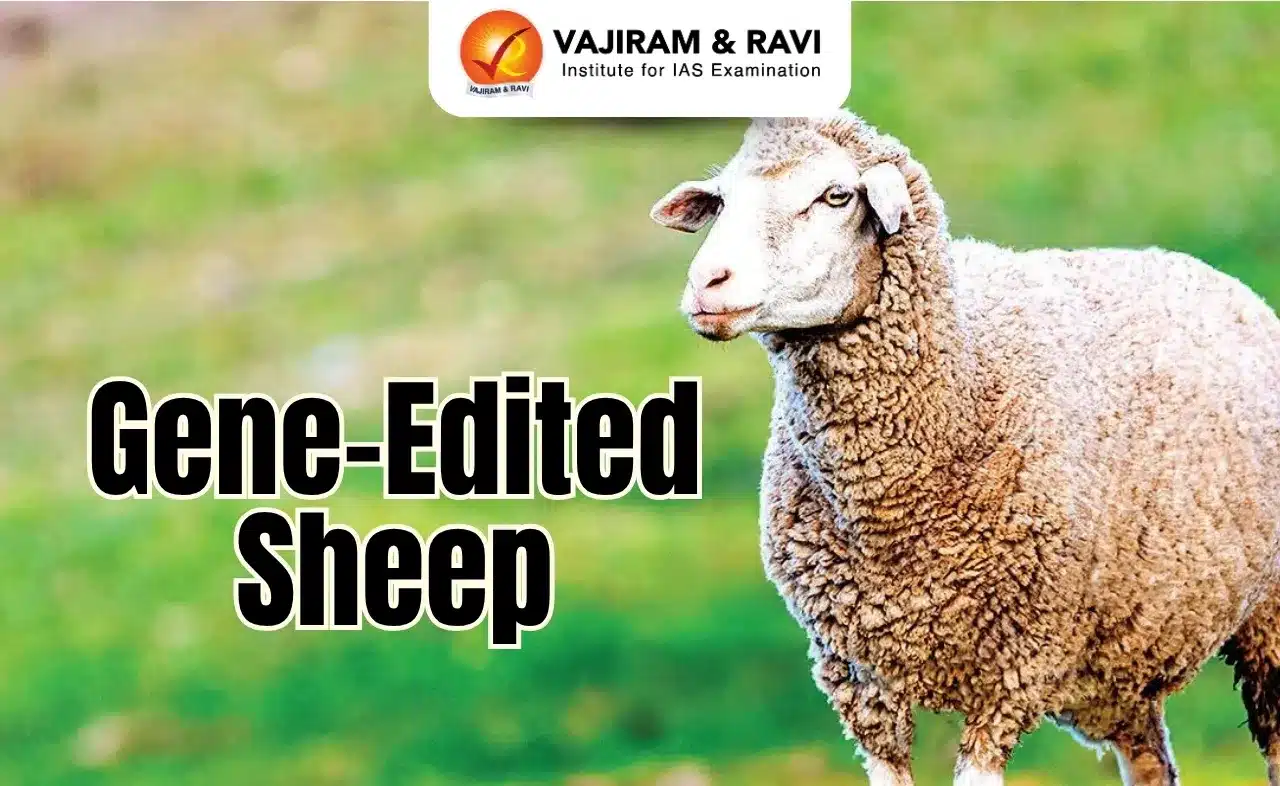Gene-Edited Sheep Latest News
- Six months ago, a team led by Professor Riyaz Ahmad Shah at Sher-e-Kashmir University (SKUAST), Srinagar, successfully birthed India’s first gene-edited sheep—a Kashmir Merino.
- The breakthrough was kept under wraps until gene sequencing confirmed its success. This milestone marks a major step in India’s genetic research, opening doors to transgenic advancements in livestock aimed at improving meat and milk yield, disease resistance, and climate resilience.
Kashmir Merino
- Kashmir Merino is a sheep breed developed in Kashmir Valley, India, known for its fine, high-quality wool and good meat production.
- It is a dual-purpose breed, meaning it’s used for both wool and meat, and it is well-suited to the harsh conditions of the Kashmir Valley.
Development
- The Kashmir Merino breed was evolved around 1960 at Govt. Sheep Breeding and Reserch Farm Reasi (Jammu).
- It was developed through a cross-breeding program that involved native Kashmir sheep breeds like Poonchi, Gaddi, and Bakerwal, and exotic breeds like Australian Merino and Delaine rams.
Productivity
- The breed is 3 to 4 times more productive than local sheep in terms of both wool and meat production, and is comparable to exotic fine wool breeds.
Adaptability
- It is well-adapted to the harsh climatic conditions and diseases of the Kashmir Valley.
India’s First Gene-Edited Sheep: A Landmark Achievement
- Six months after its birth, India’s first gene-edited sheep—a Kashmir Merino—is now healthy and thriving, marking a significant breakthrough in livestock biotechnology.
- Gene editing is a precise technique that allows scientists to modify or alter specific DNA sequences within an organism’s genome.
- It’s used to correct genetic defects, improve traits, or enhance disease resistance using tools like CRISPR-Cas9.
Targeting the Myostatin Gene for Muscle Growth
- The team used CRISPR-Cas9 genome editing technology to target the myostatin gene, a known negative regulator of muscle growth.
- The myostatin gene (MSTN) plays a crucial role in regulating skeletal muscle growth and development in vertebrates.
- It encodes a protein called myostatin, which acts as a negative regulator, limiting muscle growth.
- Editing this gene resulted in a 30% increase in muscle mass, offering major potential in boosting meat yield in sheep.
Wider Significance for India
- Experts highlighted the project’s national relevance, especially in meeting rising meat demands.
- Gene-editing is essential for creating high-quality, disease-resistant livestock, and the technology is already being widely used globally.
- The introduction of this mutation through gene editing, and not through traditional crossbreeding, represents a technological leap akin to the revolution Artificial Intelligence is driving in the 21st century.
- This comes after India’s recent launch of its first gene-edited rice. It highlights the country’s rising strength in genomic science.
Challenges and Persistence
- The team’s journey began in 2020 and wasn’t smooth. It failed three times before succeeding in gene-editing.
- The embryo was developed in a lab, implanted in a surrogate mother, and the sheep was born in December 2024, weighing 3.15 kg.
From Cloning to Gene-Editing
- The SKUAST lab has come a long way since cloning the world’s first pashmina goat, Noori, in 2012.
- Noori lived for 11 years, marking a milestone in endangered species cloning.
- Cloning is the process of creating an exact genetic copy of a living organism.
- This means the cloned organism has the same DNA as the original.
- Now, the lab has advanced to gene-editing, with plans to target the FGF5 gene next to improve fibre quality.
- The FGF5 gene, also known as Fibroblast Growth Factor 5.
- It plays a critical role in regulating hair growth, particularly the length of hair, in mammals.
Gene-Edited Sheep FAQs
Q1. What is gene editing in animals?
Ans. It is a technique to alter specific genes, improving traits like muscle growth, disease resistance, and productivity in livestock.
Q2. Which gene was targeted in India’s first gene-edited sheep?
Ans. The myostatin gene, which limits muscle growth, was edited to boost muscle mass by up to 30 percent.
Q3. Which technology was used for editing the gene?
Ans. CRISPR-Cas9 technology was used, enabling precise modification of the myostatin gene in the sheep’s genome.
Q4. Why is this sheep significant?
Ans. It represents India’s entry into advanced livestock genets, aiming for better meat yield and disease resistance through gene editing.
Q5. Which institution led this breakthrough?
Ans. Sher-e-Kashmir University of Agricultural Sciences and Technology (SKUAST), Srinagar, pioneered the project under Prof. Riyaz Ahmad Shah.
Last updated on June, 2025
→ UPSC Notification 2025 was released on 22nd January 2025.
→ UPSC Prelims Result 2025 is out now for the CSE held on 25 May 2025.
→ UPSC Prelims Question Paper 2025 and Unofficial Prelims Answer Key 2025 are available now.
→ UPSC Calendar 2026 is released on 15th May, 2025.
→ The UPSC Vacancy 2025 were released 1129, out of which 979 were for UPSC CSE and remaining 150 are for UPSC IFoS.
→ UPSC Mains 2025 will be conducted on 22nd August 2025.
→ UPSC Prelims 2026 will be conducted on 24th May, 2026 & UPSC Mains 2026 will be conducted on 21st August 2026.
→ The UPSC Selection Process is of 3 stages-Prelims, Mains and Interview.
→ UPSC Result 2024 is released with latest UPSC Marksheet 2024. Check Now!
→ UPSC Toppers List 2024 is released now. Shakti Dubey is UPSC AIR 1 2024 Topper.
→ Also check Best IAS Coaching in Delhi
Tags: gene-edited sheep mains articles upsc currrent affairs upsc mains currrent afffairs
























